Chinese and Japanese – why does learning Asian languages make sense?

German, English, Spanish, or French – these are the languages most commonly taught in traditional schools. However, at the International Trilingual School of Warsaw (ITSW), children can also learn less traditional and future-oriented languages, such as Chinese and Japanese.
The ability to communicate in these languages is becoming increasingly important in the world of business and politics. The region where Chinese and Japanese dominate is experiencing such dynamic economic growth that running an international company, signing contracts, or even working on translations from Japanese or Chinese are skills that provide a significant advantage in the job market.
The economic center is shifting to Asia
China, Japan, South Korea, and India – these are the countries that currently stand out in terms of economic growth, generate significant income, and invest in new technologies. They are already centers of global production and trade, and international corporations are moving their factories and offices to Asia.
What drives this? Primarily, lower labor costs and the need to do business close to markets. In Japan and China, demographics are also changing; residents are increasingly well-educated and have innovative approaches to business strategies. Many European, including Polish, companies employ citizens from these distant countries to better understand their culture and business practices.
But why are we talking about this in the context of early education? Because children learn foreign languages the fastest and easiest. Chinese is a tonal language, meaning that a word can have different meanings depending on the tone, i.e., the height, loudness, and pitch of the spoken word/sentence. The earlier we start teaching them, the better. A child at the age of 6 can already be a native speaker.
Read more on the blog:
Language nursery – what are the benefits of multilingual education?
Chinese is the language of the future
The rapid economic development of Asian companies and the growing role they play on the international stage make speaking and writing in the Chinese language highly desirable skills in business and politics, and will continue to be so for the next few years or even decades. Over a billion people worldwide speak Chinese. It is the most widely spoken language in terms of the number of users.
Chinese is also extremely important in fields such as science, technology, innovation, artificial intelligence, digital technology, and renewable energy. Individuals aspiring to careers in these fields, after learning the Chinese language, have vast opportunities in their professions. Proficiency in Chinese is also increasingly becoming a necessary skill for those involved in international economic and political relations, tourism, culture, and the arts.
How is learning Chinese and Japanese at ITSW?
At the International Trilingual School of Warsaw, children learn languages through language immersion. This method involves surrounding students, from a young age, with people who use the language they want to learn. Even during classes in the nursery and language preschool, teachers speak to children in a foreign language. Not only do they naturally become familiar with it, but they also use it in very everyday situations.
As a result, students:
- are fully immersed in the language,
- develop bilingual or trilingual skill,
- learn about the culture in which the language is used,
- continuously expand their vocabulary,
- learning is tailored to the individual needs of the student.
- Children learning Chinese or Japanese in nursery and preschool do not feel overwhelmed by the amount of material to master. Their learning process is enjoyable, happening through play, and associated with time spent among peers and teachers.
Why is it worth starting the learning of Asian languages from an early age?
Children who are exposed to Chinese, Japanese, or any other foreign language from an early age learn it faster than adults. Early exposure of a child to the sounds and melody of these languages promotes better assimilation of tones and intonations, which can facilitate later pronunciation improvement. Learning a tonal language from an early age allows a child to naturally master the specific phonetic features of that language. This enhances their language skills and opens doors to understanding and learning about the culture, history, and society in which the language is used. At the same time, while learning a foreign language, children develop intellectually and socially.
Therefore, we encourage our youngest charges to learn languages because:
- A young mind is very plastic. Children absorb new knowledge, including foreign languages, more quickly and easily. Children who learn languages also have better mathematical and academic achievements.
- Children quickly begin to speak fluently in a foreign language, even if they cannot read or write yet.
- During the learning of a foreign language, children develop their memory, concentration.
- Language education also influences abstract thinking and creativity.
- Children during classes with a native speaker and in an international group are among people speaking in a different language and raised in different cultures. Therefore, they quickly master vocabulary, grammar, and language structure.
- Multilingual children develop socially better and relate to representatives of other cultures with respect, better understand them, and appreciate cultural diversity.
- Moreover, each language is a different way of looking at and understanding the world.
Read more on the blog:
The sooner, the better – the ability to learn a foreign language decreases with age!
When our graduates are on the threshold of adulthood and start choosing a profession, they will have more chances for well-paying jobs, as well as for continuing education abroad, including in Asian countries. Since a child’s mind is naturally suited to acquiring knowledge, it is worth taking advantage of it. Learning languages from an early age is a solid foundation for learning subsequent ones and developing multilingualism.



